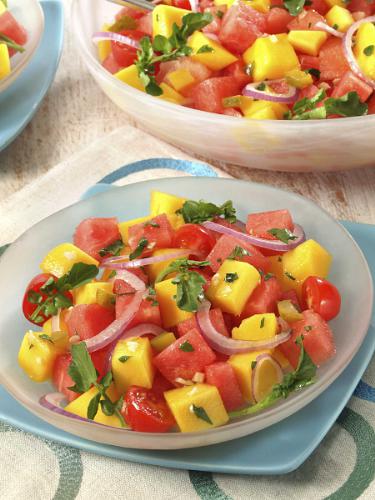 It’s manic MANGOS! An increasing body of scientific evidence makes it clear: what we eat may have an impact on the health and beauty of our skin. But what if there was a fruit—available year-round with plentiful volume just in time for skin-centric summertime—that delivered a cocktail of skin-supporting nutrients and compounds? We’d all Mangover our eating habits, adding fresh mango at every turn!
It’s manic MANGOS! An increasing body of scientific evidence makes it clear: what we eat may have an impact on the health and beauty of our skin. But what if there was a fruit—available year-round with plentiful volume just in time for skin-centric summertime—that delivered a cocktail of skin-supporting nutrients and compounds? We’d all Mangover our eating habits, adding fresh mango at every turn!
This beauty fruit contains over twenty different vitamins and minerals, and preliminary animal model research indicates that mango may protect skin from damage due to exposure to UVB radiation. In this study, mice fed mango extract experienced less skin damage from UVB radiation than those not fed mango extract. Additional research will need to be conducted in humans (Photodermatology, Photoimmunology, and Photomedicine 2013; 29: 84-89). There are four mango nutrients that stand out when it comes to skin health: vitamin C, vitamin A (or, beta carotene), and folate. Let’s take a closer look at the science behind these skin-supporting superstars.
- Vitamin C: One cup of mango delivers a whopping 100 percent of the daily requirement for this important antioxidant. Vitamin C supports many different functions in the skin, including collagen formation, regeneration, and wound repair. But did you know that vitamin C intake has been associated with improved appearance of aging skin? In a study involving 4,025 middle-aged women, researchers found that higher intakes of vitamin C were associated with lower prevalence of wrinkled appearance, dryness associated with aging, and skin thinning (American Journal of Clinical Nutrition 2007; 86: 115-31).
- Vitamin A/Beta Carotene: Mangos deliver 35 percent of the daily vitamin A requirement in the form of beta carotene (an antioxidant pigment which the body converts to vitamin A). Lower levels of vitamin A in the diet have been associated with a wrinkled appearance (American Journal of Clinical Nutrition 2007; 86: 115-31). A number of studies have also shown that an elevated intake of carotenoids, such as beta carotene, may confer protection from sunlight, lessening sunburn (American Journal of Clinical Nutrition 2012; 96(suppl): 1179S-84S). In addition, recent research in undergraduate students (male and female) who ate more fruits and vegetables experienced an increase in yellow and red skin tone due to the presence of beta carotene and lycopene, respectively, in fruits and vegetables (PLoS One 2012; 7(3): 1-9). In this study, increased yellow skin tone (due to beta carotene intake), in particular, was rated more healthful and more attractive.
- Folate: Rich in folate, one cup of mango contains 20 percent of the daily requirements for this B vitamin. Folate supports many different processes within the body, and researchers have suggested that some may have an important impact on the maintenance and function of healthy skin and that exposure to UV radiation can breakdown folate, resulting in lower levels in the skin (Bioactive Dietary Factors and Plant Extracts in Dermatology, Nutrition, and Health. Springer, New York, 2013: 230-255).
The sumptuous flavor of mangos elevates any eating experience, adding a burst of nutrients, vivid color, and the taste of the tropics. The perfect ingredient for salads, smoothies, yogurt, grilled meats, or side dishes, fresh mangos give everyday favorites a summer beauty boost. For delicious mango recipes click here.














